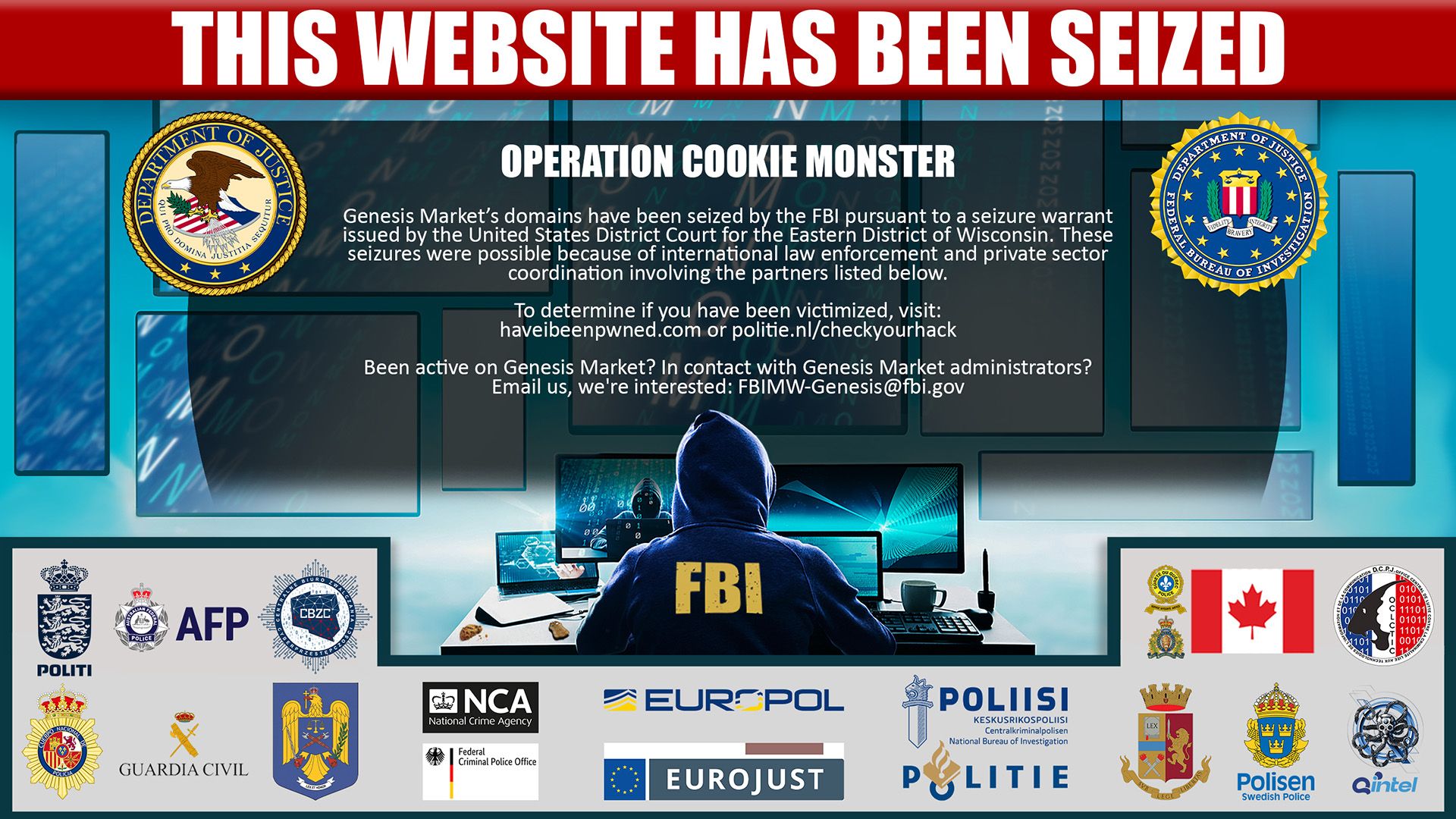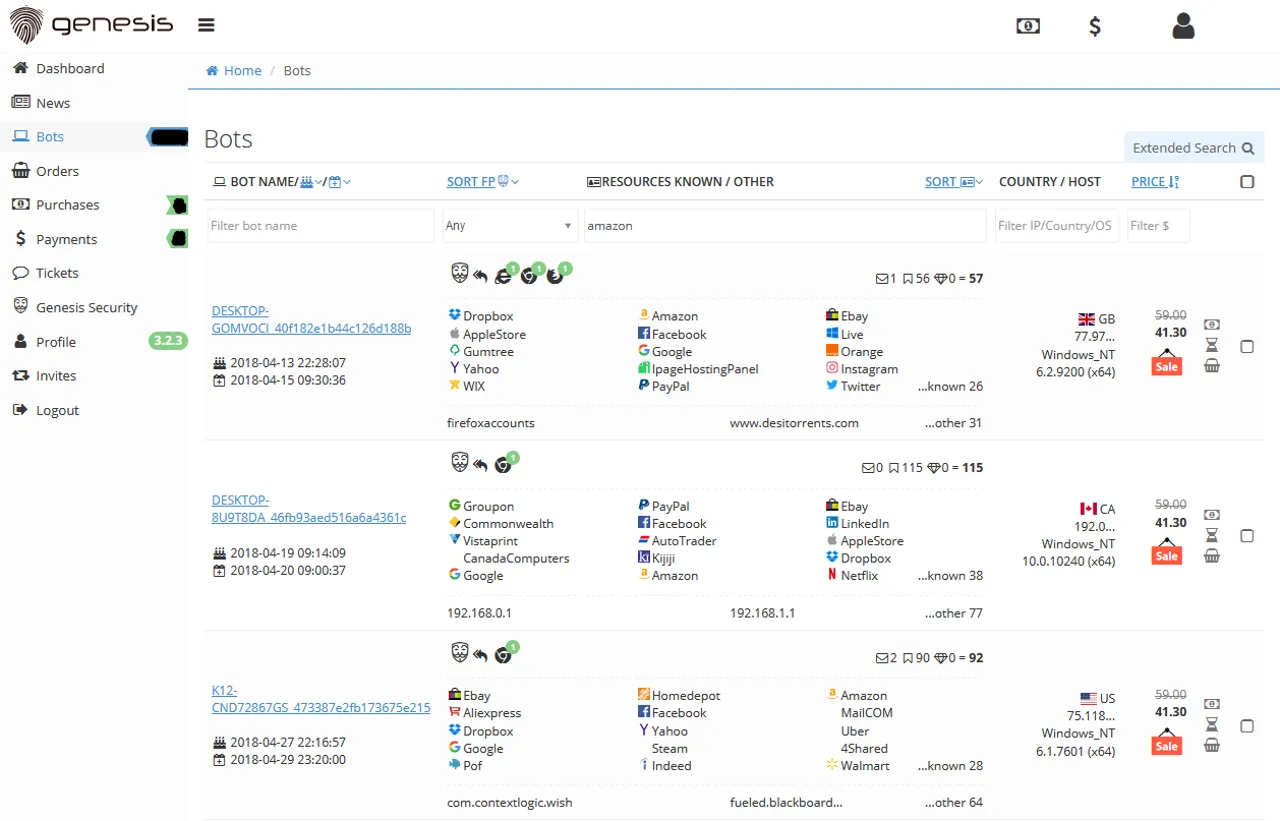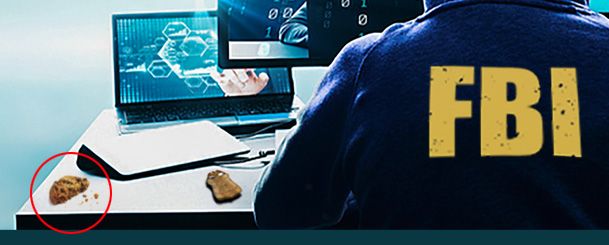Cyber Security News Aggregator
.Cyber Tzar
provide acyber security risk management
platform; including automated penetration tests and risk assesments culminating in a "cyber risk score" out of 1,000, just like a credit score.Seized Genesis Market Data is Now Searchable in Have I Been Pwned, Courtesy of the FBI and "Operation Cookie Monster"
published on 2023-04-05 12:02:44 UTC by Troy HuntContent:

A quick summary first before the details: This week, the FBI in cooperation with international law enforcement partners took down a notorious marketplace trading in stolen identity data in an effort they've named "Operation Cookie Monster". They've provided millions of impacted email addresses and passwords to Have I Been Pwned (HIBP) so that victims of the incident can discover if they have been exposed. This breach has been flagged as "sensitive" which means it is not publicly searchable, rather you must demonstrate you control the email address being searched before the results are shown. This can be done via the free notification service on HIBP and involves you entering the email address then clicking on the link sent to your inbox. Specific guidance prepared by the FBI in conjunction with the Dutch police on further steps you can take to protect yourself are detailed at the end of this blog post on the gold background. That's the short version, here's the whole story:
Ever heard that saying about how "data is the new oil"? Or that "data is the currency of the digital economy"? You've probably seen stories and infographics about how much your personal information is worth, both to legitimate organisations and criminal networks. Like any valuable commodity, marketplaces selling data inevitably emerge, some operating as legal businesses and others, well, not so much. In its simplest form, the illegal data marketplace has long involved the exchange of currency for personal records containing attributes such as email addresses, passwords, names, etc. Cybercriminals then use this data for purposes ranging from identity theft to phishing attacks to credential stuffing. So, we (the good guys) adapt and build better defences. We block known breached passwords. We implement two factor authentication. We roll out user behavioural analytics that identifies abnormalities in logins (why is Joe suddenly logging in from the other side of the world with a new machine?) And in turn, the criminals adapt, which brings us to Genesis Market.
Until this week, Genesis had been up and running for 4 years. This is an excellent primer from Catalin Cimpanu, and it describes how in order to circumvent the aforementioned fraud protection measures, cybercriminals are increasingly relying on obtaining more abstract pieces of information from victims in order to gain access to their accounts. Rather than relying on the credentials themselves and then being subject to all the modern fraud detection services mentioned above, criminals instead began to trade in a combination of "fingerprints" and "cookies". The latter will be a familiar term to most people (and was obviously the inspiration for the name behind the FBI's operation), whilst the former refers to observable attributes of the user and their browser. To see a very easy demonstration of what fingerprinting involves, go and check out amiunique.org and hit the "View my browser fingerprint" button. You'll get something similar to this:

Among more than 1.6M sampled clients, nobody has the same fingerprint as me. Somehow, using the current version of Chrome on the current version of Windows, I am a unique snowflake. Why I'm so unique is partly explained by my time zone which is shared by less than half a percent of people, but it's when that's combined with the other observable fingerprint attributes that you realise just how special I really am. For example, less than 0.01% of people have a content language request header of "en-US,en,en-AU". Only 0.12% of people share a screen width of 5,120 pixel (I'm using an ultrawide monitor). And so on and so forth. Because they're so unique, fingerprints are increasingly used as a fraud detection method such that if a malicious party attempts to impersonate a legitimate users with otherwise correct attributes (for example, the correct cookies) but the wrong fingerprint, they're rejected. Which is why we now have IMPaaS.
There's an excellent IMPaaS explanation from the Eindhoven University of Technology in the Netherlands via a paper titled Impersonation-as-a-Service: Characterising the Emerging Criminal Infrastructure for User Impersonation at Scale. Released only a year and a half after the emergence of Genesis and based on findings from a similar service, the paper explains the mechanics of IMPaaS:
IMPaaS allows attackers to systematically collect and enforce user profiles (consisting of user credentials, cookies, device and behavioural fingerprints, and other metadata) to circumvent risk-based authentication system and effectively bypass multifactor authentication mechanisms
In other words, if you have all the bits of information a website requires to persist authenticated state after the login process has successfully completed (including after any 2FA requirements), you can perform a modern equivalent of session hijacking. Obtaining this level of information is typically done via malicious software running on the victim's machine which can then grab anything useful and send it off to a C2 server where it can then be sold and used to commit fraud (from the IMPaaS paper):

Catalin's story from the early days of Genesis showed how buyers could browse through a list of compromised victims and pick their target based on the various services they had authenticated too, along with their operating system and location. Pricing was inevitably based on the value of those services with the examples below going for $41.30 each (and just like a legitimate marketplace, these were marked down prices so a real bargain!)

To make things as turn-key as possible for the criminals, buyers would then run a browser extension from Genesis that would reconstruct the required fingerprint based on the information the malware had obtained and grant them access to the victims' accounts (I'm having flashbacks of Firesheep here). It was that simple... until this week. As of now, the following banner greets anyone browsing to the Genesis website:

The aptly named "Operation Cookie Monster" is a joint effort between the FBI and a coalition of law enforcement agencies across the globe who have now put an abrupt end to Genesis. I imagine they'll be having some "discussions" with those involved in running the service, but what about the individuals who are the victims? These are the people whose identities have been put up for sale, purchased by other criminals and then abused to their detriment. The FBI approached me and asked if HIBP could be used as a mechanism to help warn victims of their exposure in the same way as we'd previously done with the Emotet malware a couple of years ago. This is well aligned with the mantra of HIBP - to do good and constructive things with data breaches after they occur - and I was happy to provide support.
There are 2 separate things that have now been loaded into HIBP, each disassociated from the other:
- Millions of compromised passwords that are now searchable via Pwned Passwords
- Millions of email addresses that are now searchable after verifying control of the address using the notification service
The Pwned Passwords API is presently hit more than 4 billion times each month, and the downloadable data set is hit, well, I don't know because anyone can grab it run it offline. The point is that password corpuses loaded into HIBP have huge reach and are used by thousands of different online services to help people make better password choices. You're probably using it without even knowing it when you signup or login to various services but if you want to check it directly, you can browse to the web interface. (If you're worried about the privacy of your password, there's a full explainer on how the service preserves anonymity but I also suggest testing it after you've changed it as a generally good practice.)
The email address search is what HIBP is so well known for and that's obviously what will help you understand if you've been impacted. Per the opening paragraph, this breach is flagged as "sensitive" so you will not get a result when searching directly from the front page or via the API, rather you'll need to use the free notification service. This approach was chosen to avoid the risk of people being further targeted as a result of their inclusion in Genesis. All existing HIBP subscribers have been sent notification emails and between individuals and those monitoring domains, tens of thousands of emails have now been sent out. Whilst the volume of accounts represented is "8M", please note that this is merely an approximation (hence the perfectly round number on HIBP), intended to be an indicative representation of scale as many of the breached accounts didn't include email addresses. This number only represents the number of unique email addresses which showed up in the data set so consider it a subset of a much larger corpus.
Let me add some final context and this is important if you do find yourself in the Genesis data: due to the nature of how the malware collected personal information and the broad range of different services victims may have been using at the time, the exposed data can differ significantly person by person. What's been provided by the FBI is one set of passwords (incidentally, as SHA-1 and NTLM hash pairs fed into the law enforcement ingestion pipeline), one set of email addresses and a list of meta data. Beyond the data already listed here, the meta data includes names, physical addresses, phone numbers and full credit card details among other personal attributes. This does not mean that all impacted individuals had each of those data classes exposed. The hope is that by listing these fields it will help victims understand, for example, why they may have observed fraudulent transactions on their card, and they can then take informed and appropriate steps to better protect themselves.
Lastly, as flagged in the intro, following is the guidance prepared by the FBI and Dutch police on how people can safeguard themselves if they get a hit in the Genesis data or frankly, just want to better protect themselves in future:
The FBI reached out to Have I Been Pwned (HIBP) to continue sharing efforts to help victims determine if they've been victimized. In this instance, the data shared emanates from the Initial Access Broker Marketplace Genesis Market. The FBI has taken action against Genesis Market, and in the process has been able to extract victim information for the purposes of alerting victims.
In all, millions of passwords and email addresses were provided which span a wide range of countries and domains. These emails and passwords were sold on Genesis Market and were used by Genesis Market users to access the various accounts and platforms that were for sale.
Prepared in conjunction with the FBI, following is the recommended guidance for those that find themselves in this collection of data:
To safeguard yourself against fraud in the future, it is important that you immediately remove the malware from your computer and then change all your passwords. Do this as follows:
- Log out of all open sessions in all web browsers on your computer.
- Remove all cookies and temporary internet files.
- Then choose one of the following two options:
- Update the virus scanner on your computer.
- Then carry out a virus scan on your computer.
- The malware will be removed.
- Then (and only then) change all your passwords. Don’t do this any earlier, as otherwise the cybercriminals will see the new passwords.
OR
- Reset the infected computer to the factory default settings:
- Then (and only then) change all your passwords. Don’t do this any earlier, as otherwise the cybercriminals will see the new passwords.
- Update the virus scanner on your computer.
How can I prevent my data being stolen (again)?
- Use a virus scanner and keep it up to date.
- Use strong passwords that are unique for each account/website.
- Use multifactor authentication. If you use a fingerprint, facial recognition, or approval on another device (such as a phone) to confirm your identity on login, it is harder for someone to access your accounts.
- Never download or install illegal software. This is a very common source of malware infection.
- When installing legal software, always check that the website is genuine.
Just one more thing to end on a lighter note: a quick shoutout to whoever at the bureau slipped a half-eaten cookie into the takedown image, having been munched on by what I can only assume is a very satisfied FBI agent after a successful "Operation Cookie Monster" 😊

https://www.troyhunt.com/seized-genesis-market-data-is-now-searchable-in-have-i-been-pwned-courtesy-of-the-fbi-and-operation-cookie-monster/
Published: 2023 04 05 12:02:44
Received: 2023 04 05 13:40:58
Feed: Troy Hunt's Blog
Source: Troy Hunt's Blog
Category: Cyber Security
Topic: Cyber Security
Views: 2
